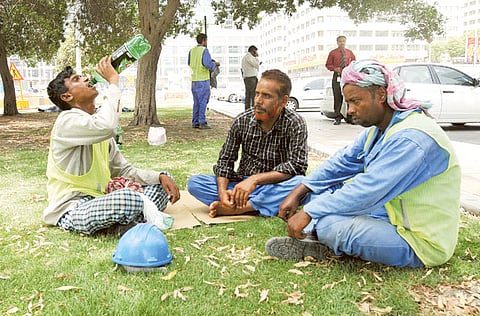Heat stroke cases higher among labourers
Special team help workers deal with the dangers of working in the summer sun

Dubai: Heat stroke cases, especially among labourers, are expected to rise with the rise in temperature, prompting a non-profit medical association to launch a heat stroke awareness campaign at labour camps.
The Dubai chapter of the Association of Kerala Medical Graduates has rolled out a two-month campaign which ends in July. So far, the medical team has reached out to more than 700 labourers, and hopes to target more than 2,000 employees in the coming weeks. The campaign selects a different labour camp in Dubai and visits every Friday morning.
Dr Ejas Kader, the convener of the social services arm of the association and a specialist orthopaedic said labourers were more prone to heat stroke than office workers.
“Labours work outdoors, often in direct sunlight, putting them at a higher risk of heat stroke and heat exhaustion. Moreover they have to wear mandatory safety gear – industrial clothing, shoes and helmet; often this gear isn’t breathable. This causes them to feel warmer than one would wearing light, cotton clothes,” he said.
Explaining the symptoms, Dr Kader said labourers are taught to recognise various signs including light-headedness, dizziness, nausea, dry mouth and skin, and in more serious cases, seizures, muscle cramps and unconsciousness.
“Several labourers have witnessed their colleagues collapse due to the heat and consequently being rushed to the emergency. During our visits this month, our medical team of eight to ten doctors has diagnosed several heat-related symptoms,” he said.
Advice
The campaign aims to raise awareness of heat stress, how it affects health and safety, and how it can be prevented. It includes an educational video on heat stroke and open question and answer session. It also provides free medical check-ups and medical supplies including supplements like electrolytes to help combat dehydration.
In terms of practical advice, labourers are instructed on handling heat stroke cases. Dr Kader said: “Once the symptoms are identified, we teach them a few practical measures; these include moving to a cool, shaded place; loosening clothing; hydrating; and pouring cool water over the head. Towards preventive measures, we advise them to stay hydrated, ensure good sleep; and take the necessary break to rest during the day.”
The mandatory midday break — 12.30pm to 3pm — rule for labourers, stipulated by the Ministry of Labour, plays an important role in reducing the cases of heat stroke, he added. “The two-and-a-half hour break helps labourers stay out of the direct sunlight, preventing further dehydration and gives them a chance to rest, allowing their bodies to reenergise.”
According to the Centres for Disease Control and Prevention, workers at greater risk of heat stress include those who are 65 years of age or older; are overweight; have heart disease or high blood pressure; or take medications that may be affected by extreme heat.


